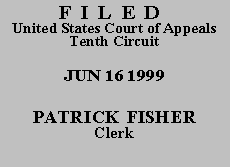

|
ENRIQUE RODRIQUEZ, Petitioner-Appellant, v. KEN KLINGER, Respondent-Appellee. |
|
Before TACHA, McKAY, and
MURPHY, Circuit Judges.
After examining the briefs and appellate record, this panel has determined unanimously that oral argument would not materially assist the determination of this appeal. See Fed. R. App. P. 34(a)(2); 10th Cir. R. 34.1(G). The case is therefore ordered submitted without oral argument.
This case is before the court on Enrique Rodriquez's pro se application for a certificate of appealability ("COA") and motion to proceed on appeal in forma pauperis. Rodriquez seeks a COA so that he can appeal the district court's dismissal of his 28 U.S.C. § 2254 petition. See 28 U.S.C. § 2253(c)(1) (providing that no appeal will lie from the denial of a § 2254 petition unless the petitioner first obtains a COA). Because Rodriquez has not made a substantial showing of the denial of constitutional right, this court denies Rodriquez a COA and dismisses this appeal. See id. § 2253(c)(2) (providing that a COA will issue only upon a substantial showing of the denial of a constitutional right).
Rodriquez was convicted of Conspiracy to Commit Murder and Murder in the First Degree in Oklahoma state court on December 20, 1994, and his conviction was affirmed by the Oklahoma Court of Criminal Appeals ("OCCA") on August 13, 1996. Accordingly, pursuant to the terms of 28 U.S.C. § 2244(d),(1) Rodriquez had to file his § 2254 habeas petition on or before August 12, 1997.(2) Because Rodriquez did not file his § 2254 habeas petition until February 13, 1998, the district court dismissed the petition as time barred. In so doing, the district court rejected Rodriquez's contention that § 2244(d)'s limitation period should be equitably tolled because the respondent warden failed to provide Rodriquez with a copy of § 2244(d), leaving him unaware of the limitations period. Relying on this court's decisions in Miller v. Marr, 141 F.3d 976, 978 (10th Cir. 1998) and Watson v. New Mexico, 45 F.3d 385, 388 (10th Cir. 1995), the district court concluded that this was not one of the "extraordinary" cases deserving of equitable tolling because Rodriquez had failed to diligently pursue his claims. In particular, the district court found that Rodriquez had failed to request a copy of the limitations provisions even though Rodriquez had access to an inmate research assistant and the "inmate research assistants were aware of the AEDPA limitations period and routinely advised inmates of same."
This court has conducted a close review of Rodriquez's application for a COA and appellate brief, both the magistrate judge's original findings and supplemental findings, the district court's order, and the entire record on appeal. That close review demonstrates that the district court's determination that Rodriquez did not diligently pursue his claims and is thus not entitled to the "extraordinary" remedy of equitable tolling is not debatable among jurists of reason, subject to a different outcome on appeal, or deserving of further proceedings. See Barefoot v. Estelle, 463 U.S. 880, 893 & n.4 (1983). Accordingly, Rodriquez has not made a substantial showing of the denial of a constitutional right and is not entitled to a COA. Rodriquez's application for a COA is DENIED and his appeal is hereby DISMISSED. Rodriquez's motion to proceed in forma pauperis is also DENIED.
ENTERED FOR THE COURT
Michael R. Murphy
Circuit Judge
*. This order and judgment is not binding precedent, except under the doctrines of law of the case, res judicata and collateral estoppel. The court generally disfavors the citation of orders and judgments; nevertheless, an order and judgment may be cited under the terms and conditions of 10th Cir. R. 36.3.
1.Section 2244(d) provides that a person in custody pursuant to a judgment of a state court must file any habeas petition within one year of "the date on which the judgment became final by the conclusion of direct review or the expiration of the time for seeking such review." 28 U.S.C. § 2244(d)(1)(A).
2.The district court concluded that Rodriquez's conviction became final on November 11, 1996. It reached this conclusion by adding ninety days to the date the OCCA affirmed Rodriquez's conviction, August 12, 1996, to account for the period within which Rodriquez could have filed a petition for certiorari to the United States Supreme Court. In two recent unpublished opinions, this court has held that district courts should not include this ninety-day certiorari period in calculating the date upon which a state conviction became final. See James v. Scott, No. 99-7005, 1999WL 285956, at *1 (10th Cir. May 7, 1999); Malony v. Poppel, No. 98-6402, 1999 WL 157428, at *1 (10th Cir. March 23, 1999). Accordingly, the appropriate date against which to measure § 2244(d)'s one-year statute of limitations is August 12, 1996, the date the OCCA affirmed Rodriquez's conviction on direct appeal. It should be noted, however, that even under the more generous calculations utilized by the district court, Rodriquez's petition was still untimely. Accordingly, the district court's error in calculation is not relevant to our determination of this appeal.